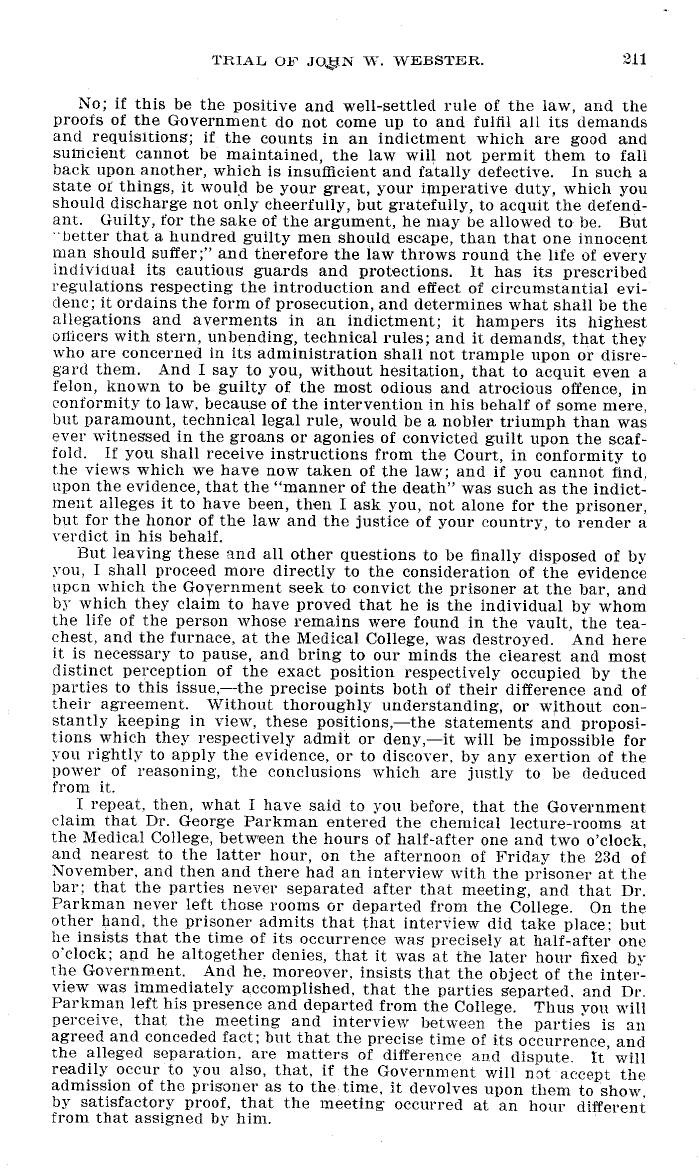|
TRIAL OF JOVN u'. WEBSTER. 211
No; if this be the positive and well-settled rule of the law, and the
proofs of the Government do not come up to and fulfil all its demands
and requisitions; if the counts in an indictment which are good and
suincient cannot be maintained, the law will not permit them to fall
back upon another, which is insufficient and fatally defective. In such a
state of things, it would be your great, your imperative duty, which you
should discharge not only cheerfully, but gratefully, to acquit the defend-
ant. Guilty, for the sake of the argument, he pray be allowed to be. But
"better that a hundred guilty men should escape, than that one innocent
man should suffer;" and therefore the law throws round the life of every
individual its cautious guards and protections. It has its prescribed
regulations respecting the introduction and effect of circumstantial evi-
dene; it ordains the form of prosecution, and determines what shall be the
allegations and averments in an indictment; it hampers its highest
officers with stern, unbending, technical rules; and it demands, that they
who are concerned in its administration shall not trample upon or disre-
gard them. And I say to you, without hesitation, that to acquit even a
felon, known to be guilty of the most odious and atrocious offence, in
conformity to law, because of the intervention in his behalf of some mere,
but paramount, technical legal rule, would be a nobler triumph than was
ever witnessed in the groans or agonies of convicted guilt upon the scaf-
fold. If you shall receive instructions from the Court, in conformity to
the views which we have now taken of the law; and if you cannot find,
upon the evidence, that the "manner of the death" was such as the indict-
ment alleges it to have been, then I ask you, not alone for the prisoner,
but for the honor of the law and the justice of your country, to render a
verdict in his behalf.
But leaving these and all other questions to be finally disposed of by
you, I shall proceed more directly to the consideration of the evidence
upcn which the Government seek to convict the prisoner at the bar, and
by which they claim to have proved that he is the individual by whom
the life of the person whose remains were found in the vault, the tea-
chest, and the furnace, at the Medical College, was destroyed. And here
it is necessary to pause, and bring to our minds the clearest and most
distinct perception of the exact position respectively occupied by the
parties to this issue,-the precise points both of their difference and of
their agreement. Without thoroughly understanding, or without con-
stantly keeping in view, these positions,-the statements and proposi-
tions which they respectively admit or deny,-it will be impossible for
you rightly to apply the evidence, or to discover, by any exertion of the
power of reasoning, the conclusions which are justly to be deduced
from it.
I repeat, then, what I have said to you before, that the Government
claim that Dr. George Parkman entered the chemical lecture-rooms at
the Medical College, between the hours of half-after one and two o'clock,
and nearest to the latter hour, on the afternoon of Friday the 23d of
November, and then and there had an interview with the prisoner at the
bar; that the parties never separated after that, meeting, and that Dr.
Parkman never left those rooms or departed from the College. On the
other hand. the prisoner admits that that interview did take place: but
he insists that the time of its occurrence was precisely at half-after one
o'clock; and he altogether denies, that it was at tire later hour fixed by
the Government. And he, moreover, insists that the object of the inter-
view was immediately accomplished, that the parties separted, and Dr.
Parkman left his presence and departed from the College. Thus yon will
perceive, that the meeting and interview between the parties is an
agreed and conceded fact; but that the precise time of its occurrence, and
the alleged separation, are matters of difference and dispute. It will
readily occur to you also, that if the Government will not accept the
admission of the prisoner as to the time, it devolves upon them to show,
by satisfactory proof, that the meeting occurred at an hour different
from that assigned by him.
|

